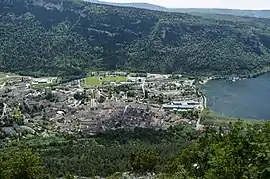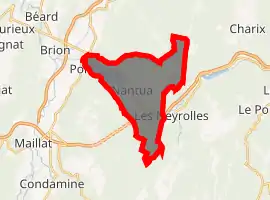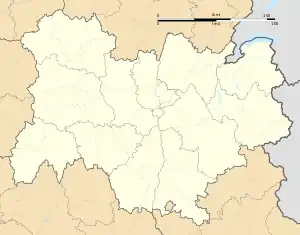Nantua
Nantua (French pronunciation: [nɑ̃tɥa] (![]() listen)) is a commune and subprefecture in the Ain department in eastern France. The usual demonym for its inhabitants is Nantuatien(ne); however, they are also sometimes called Catholards, after a needle used by leatherworkers. Indeed, Nantua has long been a town of tanners and shoemakers.
listen)) is a commune and subprefecture in the Ain department in eastern France. The usual demonym for its inhabitants is Nantuatien(ne); however, they are also sometimes called Catholards, after a needle used by leatherworkers. Indeed, Nantua has long been a town of tanners and shoemakers.
Nantua | |
|---|---|
Subprefecture and commune | |
 A general view of Nantua | |
.svg.png.webp) Coat of arms | |
Location of Nantua 
| |
 Nantua  Nantua | |
| Coordinates: 46°09′07″N 5°36′28″E | |
| Country | France |
| Region | Auvergne-Rhône-Alpes |
| Department | Ain |
| Arrondissement | Nantua |
| Canton | Nantua |
| Intercommunality | Haut-Bugey Agglomération |
| Government | |
| • Mayor (2020–2026) | Jean-Pascal Thomasset |
| Area 1 | 12.79 km2 (4.94 sq mi) |
| Population (2017-01-01)[1] | 3,446 |
| • Density | 270/km2 (700/sq mi) |
| Time zone | UTC+01:00 (CET) |
| • Summer (DST) | UTC+02:00 (CEST) |
| INSEE/Postal code | 01269 /01130 |
| 1 French Land Register data, which excludes lakes, ponds, glaciers > 1 km2 (0.386 sq mi or 247 acres) and river estuaries. | |
It is located in the Haut-Bugey region, among the southern foothills of the Jura Mountains, and is famous for its fresh-water fish and crayfish.[2]
History
The town grew up around a Benedictine Monastery founded in 671 by St. Amand and the church of St Peter where the body of Charles the Bald was initially buried.
The Priory of Nantua was sacked and burned in 1230 by Etienne I of Thoire-Villars.[3] Later, Boniface of Savoy, Archbishop of Canterbury was selected Prior of Nantua in 1232.[3]
Population
| Year | Pop. | ±% |
|---|---|---|
| 2006 | 3,693 | — |
| 2007 | 3,663 | −0.8% |
| 2008 | 3,633 | −0.8% |
| 2009 | 3,639 | +0.2% |
| 2010 | 3,713 | +2.0% |
| 2011 | 3,651 | −1.7% |
| 2012 | 3,588 | −1.7% |
| 2013 | 3,524 | −1.8% |
| 2014 | 3,534 | +0.3% |
| 2015 | 3,525 | −0.3% |
| 2016 | 3,482 | −1.2% |
Climate
Nantua faces a small lake on its west side and is protected by high cliffs on its landward sides which gives rise to a relatively mild continental climate.
References
- "Populations légales 2017". INSEE. Retrieved 6 January 2020.
- Waverley Root, The Food of France, p. 215
- Eugene L. Cox, The Eagles of Savoy, (Princeton University Press, 1974), 17-18.
External links
| Wikimedia Commons has media related to Nantua. |
- Town council website (in French)
- Tourism office website (in French)